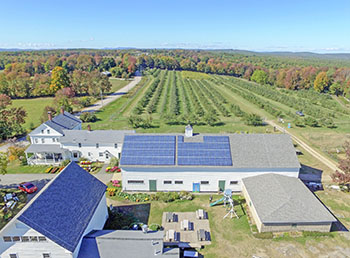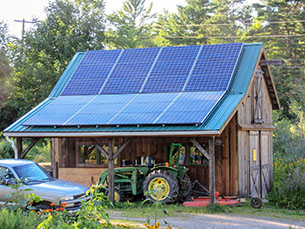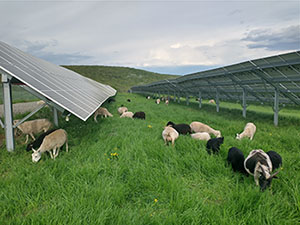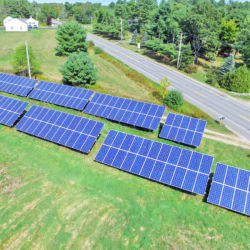DACF Home → Bureaus & Programs → Bureau of Agriculture → Agricultural Resource Development Division → Farmer Resources → Solar Siting Resources
Agricultural Solar Siting Resources
There is growing interest in solar energy development in Maine. Farms are exploring opportunities to generate solar power to help power on-farm energy needs. Some farms are interested in diversifying their income streams by leasing land for solar development while continuing agricultural production.

McDougal Orchard's Barn. Photo Courtesy of Revision Energy.
The Department of Agriculture, Conservation and Forestry (DACF) supports the state’s goals for reducing reliance on fossil fuels and pursuing renewable energy generation. DACF encourages that, whenever possible, commercial scale solar projects be sited on non-agricultural lands, given the finite amount of prime agricultural soils in Maine. When solar is developed on agricultural land, the DACF encourages the development of dual-use solar projects.
The DACF has compiled a robust set of resources for anyone interested in learning more about the intersection of solar power and agriculture. They range from technical guidance for developers regarding installation and decommissioning, to checklists for farmers who are considering solar development on their lands.
Solar Siting Resources
State Resources
- DACF Policy for the Determination of PFAS Contaminated Land Pursuant to 35-A MRSA § 3210-J (PDF) - This memo sets forth how DACF's Bureau of Agriculture, Food and Rural Resources (BAFRR) shall determine that PFAS-contaminated land may not presently be used for current or historical agricultural purposes.
- DACF Technical Guidance for Utility-Scale Solar Installations and Development on Agricultural, Forested, and Natural Lands (PDF) – This guidance document is intended to provide farmers and forest landowners with practical information when considering solar development on their property, as well as planning important preconstruction, construction, and post-construction/decommissioning activities. It further provides technical information for solar developers to consider when designing, installing, and removing solar projects.
- DACF Guide to Determining Prime Farmland Soils and Soils of Statewide Importance for Siting Solar Projects in Maine (PDF) - Provides technical information necessary to assist solar developers to determine if proposed sites contain prime farmland soils and soils of statewide importance.
- Solar Installation Applications Fact sheet (PDF) – An overview of the different types of solar installations, including information on foundation types, installation methods, and layout.
- DACF’s Maine Natural Areas Program (MNAP) offers environmental site review services for rare, threatened, and endangered plants, and rare and exemplary habitats for solar energy projects.
- Maine Department of Inland Fisheries and Wildlife (MDIFW) offers environmental site review services for rare, threatened, and endangered animals, significant wildlife habitat, and essential wildlife habitat. MDIFW has also published Solar Energy Project General Resource Guidance and Recommendations – A guidance document created to assist solar energy project applicants identify sensitive wildlife and fisheries resources, and incorporating measures to eliminate or reduce adverse impacts early in the project design and development stages.
Additional Maine Resources

Little Ridge Farm.
Photo Courtesy of Revision Energy.
- Maine Farmland Trust's Farmland and Solar Development Resource Page – A collection of helpful context and useful tools for community members, municipal officials, and solar developers seeking to balance new solar installations with the preservation of agricultural soils. Resources on this page include Balancing Solar Development and Farmland Protection: A Solar Siting Guide for Maine Towns, a guide developed in collaboration with DACF to support municipalities in crafting new solar ordinances, and Solar Siting Guidelines, a compilation of 6 key priorities when siting new solar projects.
- Maine Audubon’s Best Practices for Low Impact Solar Siting, Design, and Maintenance - Avoiding and Minimizing Impacts to Natural and Agricultural Resources – A guide to best solar siting practices with an emphasis on protecting natural resources and agricultural land.
- Maine Audubon’s Solar Siting Mapping Tool – A GIS tool to assist municipalities, developers, and others identify suitable areas for solar development with the least impact to natural resources.
- Renewable Energy and Wildlife in Maine: A guide to avoiding, minimizing and mitigating impacts to wildlife and habitat from solar, wind, and transmission facilities – A natural areas and working lands guide for solar siting for developers, municipalities and the public. Written by Appalachian Mountain Club, Land for Good, Maine Audubon, Maine Farmland Trust, Maine Organic Farmers and Gardeners Association, Maine Organic Milk Producers, Natural Resources Council of Maine, National Young Farmers Coalition, and The Nature Conservancy.
- Others:
Dual-Use Resources
- DACF Dual-Use (Agrivoltaics) Solar Installations Fact sheet (PDF) – An overview of types of dual-use applications and their advantages and disadvantages.
- American Farmland Trust Dual-Use Fact sheet – A fact sheet depicting five case studies of dual-use solar arrays in New England.
- The University of Massachusetts’ Clean Energy Extension has published several research projects on dual-use including vegetable production trials on their UMass Amherst Research Farm and cranberry production.
- Hyperion Systems LLC’s Dual-Use Financial Modeling Tool – A spreadsheet farmers, developers, and other invested parties can use to cost compare farming without solar, with a traditional solar installation, and a dual-use system.
- Others:
- US Department of Energy’s Farmer’s Guide to Going Solar.
- The Maine Sustainable Agriculture Society’s Maine Greenhouse and Covered Infrastructure program.
Solar Grazing

Photo Courtesy of Crescent Run Farm.
- Solar Farm Grazing Best Management Practices for Sheep (PDF) – The DACF and University of Maine Cooperative Extension (UMCE), with assistance from USDA’s Natural Resource Conservation Service, have created Best Management Practices (BMPs) for sheep grazing at solar installations. This guidance document is intended to provide farmers and landowners with practical information for establishing and maintaining appropriate vegetative ground cover utilizing sheep while minimizing soil erosion and storm runoff. The BMPs should be viewed as guidelines that provide a starting framework for planning purposes. NOTE: for solar projects 20 acres or greater that must receive permits from the Maine Department of Environmental Protection (DEP), additional steps will need to be taken to gain DEP approval for solar grazing at the site. For more information, please contact the appropriate DEP regional office.
- American Solar Grazing Association
Regional Resources
- The Smart Solar Siting Partnership Project for New England – This multi-stakeholder group offers farmers, policy makers, and the public solar policy analyses, solar siting case studies, land use research.
- U.S. Department of Energy's InSPIRE project – Offers a host of low-impact solar development resources including publications and webinars on dual-use as well as a guidebook for on best practices for low-impact solar on agricultural land.

Morris Farm. Photo Courtesy of Revision Energy.
Consumer Resources
- Maine Farmland Trust: Information for Owners of Maine Farmland on Commercial Solar Development – A fact sheet for farmland owners which identifies issues and considerations for leasing land for solar development, and evaluating option and lease agreements.
- Interstate Renewable Energy Council (IREC)’s Solar Smart Consumer Checklist – This checklist provides information, considerations, and protections to consider before entering into a contract.
- IREC’s Clean Energy Consumer Bill of Rights – Addresses important consumer issues, including safety, contractual transparency, warranties, advertising, privacy, and more.